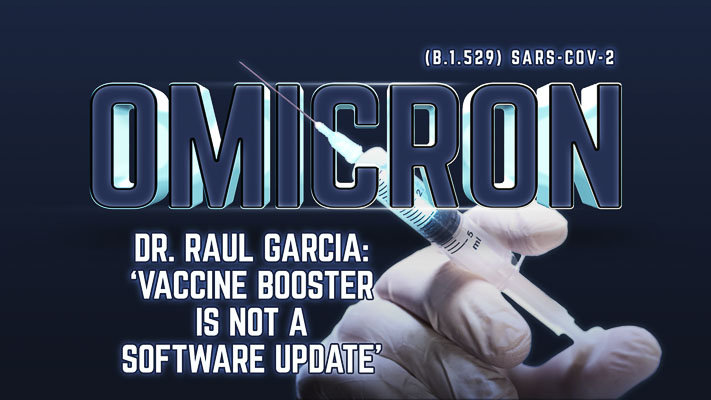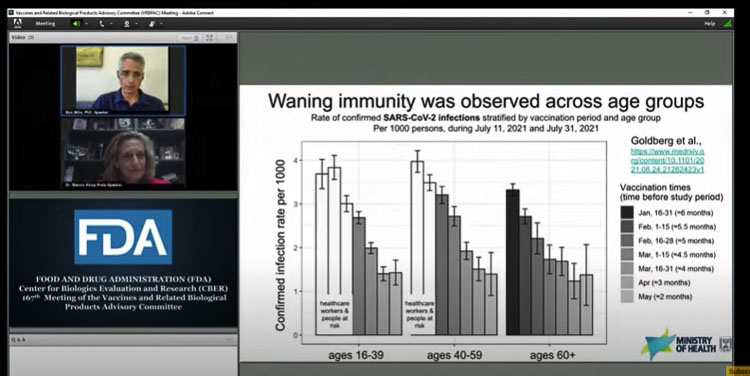
Lab tests indicate the Pfizer vaccine may be up to 40 times less effective against Omicron variant
Several recent news reports indicate the Pfizer mRNA vaccine is less effective against the Omicron variant of COVID-19. Reports from Israel, the U.K., and even Pfizer indicate both the Pfizer and the AstraZeneca vaccines have reduced, and in some cases no effect on stopping Omicron. The Pfizer-BioNTech vaccine uses mRNA technology, while the AstraZeneca vaccine uses an adenovirus vector.
Yet, while encouraging citizens to get vaccinated, numerous leaders and public figures are using fear and hyperbole as part of their messaging. “Thirty-four percent of Washingtonians are walking around with a time bomb in their backpack because they’re not vaccinated,” Gov. Jay Inslee said at a recent press conference.
“You’re either going to have had COVID, you’re going to have a vaccination, or you’re going to be dead,” said the governor.
Talk show host Jason Rantz highlights Gov. Jay Inslee’s recent remarks trying to scare people into getting vaccinated. He includes two videos of Inslee making those remarks. Video courtesy Jason Rantz Show.
These statements occur after the CDC has changed their definition of “vaccination” so that it no longer has to provide immunity from getting COVID-19. There are increasing numbers of breakthrough cases of COVID. The waning immunity offered by the three FDA-approved vaccines causes many people to wonder how much protection the vaccines actually provide from the constantly evolving coronavirus.
Waning immunity from vaccines was at the center of a September debate among members of a Food and Drug Administration (FDA) panel, where they were asked to consider approving a third booster shot of the Pfizer vaccine. On the same day, the Centers for Disease Control and Prevention (CDC) reported the Pfizer mRNA vaccine delivers less long-term protection from hospitalization than the Moderna vaccine.
Sen. Ron Johnson (Wisconsin) last week accused Dr. Anthony Fauci of using the virus to keep Americans afraid, making them easier to control. “You want to create a state of fear, to keep us in a state of fear, to maintain the controls, and that’s what you see here in the United States,” Johnson said.
Dr. Raul Garcia is a Yakima emergency room physician who was a guest on John Carlson’s KVI radio show Monday morning. Carlson shared that Dr. Fauci of the CDC is “increasingly strident in his pronouncements” and asked Garcia what he thought.
“We’re selling it in a way that people are getting skeptical because the message is not completely true,” Garcia said. “Instead we are dividing our families, our neighbors, our communities more and more.”
He believes in education. Dr. Garcia and his family are vaccinated. “People should go out there and be protected and make those decisions for themselves and their family.”
Garcia believes the vaccines do offer protection. But so does the natural immunity one gets from having recovered from COVID sickness.
Dr. Fauci said on Sunday: “if you want to be optimally protected, absolutely get a booster, if you’ve already had your primary vaccination.” He was then asked if we can expect yearly boosters?
“It’s tough to tell, because the third shot of an mRNA could not only do what we absolutely know it does, it dramatically increases the level of protection,” Fauci said. “But from an immunological standpoint, it could very well increase the durability of protection.”
Does Garcia agree with Fauci on yearly boosters?
“I don’t concur,” he said. “Because the way that we are selling this, we’re going to have 35 boosters. So here’s (what) I would like everybody to understand: the boosters are not a software update.”
“These boosters are not a software update,” he emphasized again. “If the pharmaceutical companies would come out and say, ‘we have a booster that includes all the new variants, and this is different than the one that you received before’, then you would think about it and say that is beneficial.”
“It doesn’t make sense,” Garcia said, because “you’re getting the same vaccine that you got a year ago.”
Dr. Raul Garcia was on KVI’s John Carlson radio show Monday. He shared “this is not a software update” when it comes to the current boosters. The virus has mutated yet the shots were designed for the original Wuhan coronavirus.
In spite of initial indications showing it is not as bad as the original COVID-19 virus or the Delta variant, people are understandably anxious about the Omicron variant. Initial reports from South Africa indicated Omicron is more contagious, but has mild symptoms and people can be treated from home.
Researchers at the University of Washington found that 13 percent of 217 positive coronavirus case specimens collected on Wednesday had the Omicron mutation. That was up from about 7 percent of samples they had tested from the day before, and 3 percent from the day before that. The state had its first identified cases only two weeks ago.
Vaccines less effective against Omicron
Last week, prior to Fauci’s Sunday remarks, it was reported by Pfizer-BioNTech that their COVID-19 vaccine is less effective against the Omicron variant than other strains of the virus. The two companies reported this citing interim results from a study they’re conducting.
On Monday, an Oxford University study found that two doses of the Oxford-AstraZeneca or Pfizer-BioNTech COVID-19 vaccines are substantially less effective at fighting Omicron compared to previous variants of the coronavirus. Blood samples were tested 28 days after patients had received their second vaccination shot.
The research paper noted that some vaccine recipients “failed to neutralize [the virus] at all.” The pre-print study is not yet to be peer reviewed, but was published on the MedRxiv server.
Separately, the Jerusalem Post reported the protection of even three shots of the Pfizer mRNA vaccine is four times less against the Omicron than the Delta variant. The study is based on exclusive data available in Sheba Medical Center as part of the large serology study conducted among health workers at the medical center.
Those who received the second dose did not have any neutralization ability against the variant. They continued to have some protection against Delta and even the original Wuhan strain.
“There was no neutralization ability whatsoever, and that is very worrisome,” said Dr. Gili Regev-Yochay, director of the Infectious Disease Epidemiology Unit at the hospital.
It is also unclear if people who received two doses more recently would also be protected, she said. Lab tests conducted in South Africa last week showed that antibodies from two shots of the Pfizer vaccine may be up to 40 times less effective against the Omicron variant.
In response to these studies, Dr. Sharon Alroy-Preis, head of Israel’s Public Health Services, said in an interview Saturday night that the ministry is considering asking people to get their third dose as soon as three months after the second.
The Israeli study is a neutralizing antibody study done in the lab and not based upon real-world data. It has been sent out for peer review..

A report published by the U.K.’s Health Security Agency on Friday estimated that two doses of a COVID vaccine were significantly less effective at preventing symptomatic disease through infection from the Omicron variant compared to Delta. However, the report noted that after a booster dose, vaccines were thought to be 70 to 75 percent effective at preventing symptomatic infections.
If the vaccine only prevents “symptomatic infection,” that could possibly increase the number of asymptomatic individuals continuing to interact with others, further spreading what is believed to be a highly contagious variant of COVID-19.
The Pfizer CEO said last week a 4th booster may be needed sooner than expected. Perhaps Dr. Garcia is right – they’ll be pushing 35 boosters before the pandemic is over.
News reports indicate there are 9 reported cases of Omicron in Washington state last week. Today it has been reported there are an additional 29 cases as of Dec. 8. The Washington Department of Health continues to emphasize the importance of vaccination. “Vaccines remain the best public health tool available to protect people from COVID-19, slow transmission, and preserve our healthcare system,” DOH said recently in a press release.
Clark County Public Health reports 5,337 breakthrough cases, 61 of whom have died. Statewide, the DOH reports 80,902 breakthrough cases and 806 COVID deaths of vaccinated individuals.









